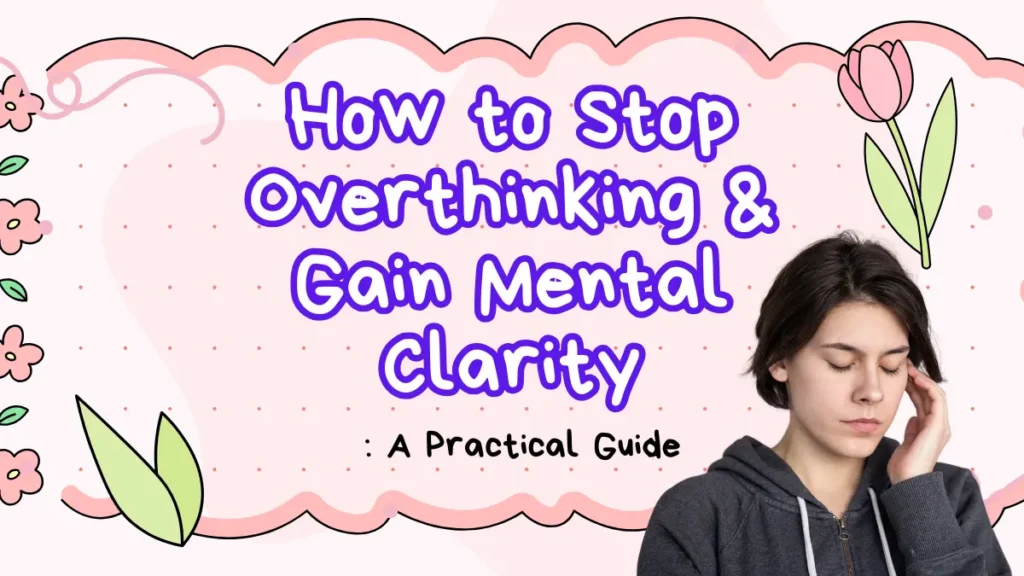Stop Overthinking & Gain Mental Clarity
Do you ever find yourself trapped in a loop of endless thoughts, replaying conversations, worrying about the future, or second-guessing your decisions? Overthinking is a common struggle that can drain your energy, cloud your judgment, and steal your peace of mind. The good news? You can break free from this mental spiral and regain clarity.
In this guide, we’ll explore practical tips to stop overthinking, understand its root causes, and cultivate mental clarity so you can live with more confidence and ease.

Why Do We Overthink? Understanding the Root Causes
Overthinking often stems from:
- Fear of failure or making mistakes – The brain tries to “protect” us by analyzing every possible outcome.
- Perfectionism – The belief that everything must be flawless leads to endless deliberation.
- Unresolved past experiences – Past traumas or regrets can keep the mind stuck in replay mode.
- Lack of control – When life feels uncertain, overthinking becomes a false sense of control.
Recognizing these triggers is the first step toward breaking the cycle.
How to Stop Overthinking: 7 Science-Backed Strategies
1. Practice Mindfulness & Grounding Techniques
Overthinking thrives when we’re lost in thoughts about the past or future. Mindfulness brings you back to the present. Try:
- The 5-4-3-2-1 technique: Name 5 things you see, 4 you can touch, 3 you hear, 2 you smell, and 1 you taste.
- Deep breathing exercises to calm your nervous system.
Video Credits
2. Set a “Worry Time”
Instead of letting anxious thoughts dominate your day, schedule a 10-15 minute “worry window.” Write down your concerns during this time, then let them go. This trains your brain to contain overthinking.
3. Challenge Negative Thoughts
Ask yourself :_
- “Is this thought helpful or just repetitive?”
- “What’s the evidence for and against this worry?”
- “Would I say this to a friend?”
Often, overthinking is based on irrational fears—questioning them weakens their power.
4. Take Action (Even Small Steps).
Overthinking paralyzes; action liberates. Break decisions into smaller steps:
- Stuck on a career move? Research one option today.
- Worried about a conversation? Draft a message and send it later.
Progress, no matter how small, reduces anxiety.
5. Limit Decision Fatigue
Too many choices fuel overthinking. Simplify by:
- Setting defaults (e.g., meal prepping to avoid daily “what to eat” stress).
- Using the “good enough” rule—aim for progress, not perfection.
6. Engage in Physical Activity
Exercise reduces cortisol (the stress hormone) and increases endorphins. Even a 10-minute walk can shift your mindset.
7. Cultivate Gratitude & Positive Focus
Overthinking magnifies problems; gratitude highlights solutions. Keep a daily gratitude journal—writing down 3 things you’re thankful for rewires your brain for positivity.
How to Gain Mental Clarity for Long-Term Peace
Stopping overthinking is just the first step. To sustain mental clarity, try these habits:
– Declutter Your Environment
A messy space = a messy mind. Organize your workspace and digital life to reduce cognitive overload.
– Prioritize Sleep & Rest
Sleep deprivation fuels anxiety. Aim for 7-9 hours and practice a wind-down routine (e.g., reading instead of scrolling).
– Practice Digital Detoxes
Constant notifications fragment focus. Set phone-free hours and unsubscribe from unnecessary emails.
– Learn to Let Go
Not every thought deserves your attention. Adopt the mantra: “If it’s not urgent or important, I release it.”
Final Thoughts: Embrace Imperfection & Trust Yourself
Overthinking doesn’t prevent mistakes—it just steals joy. The key is awareness, action, and self-compassion. You won’t always have all the answers, and that’s okay.
Which tip resonated with you the most? Try one strategy today and notice the shift in your mental clarity. If you found this helpful, share it with someone who needs it!











